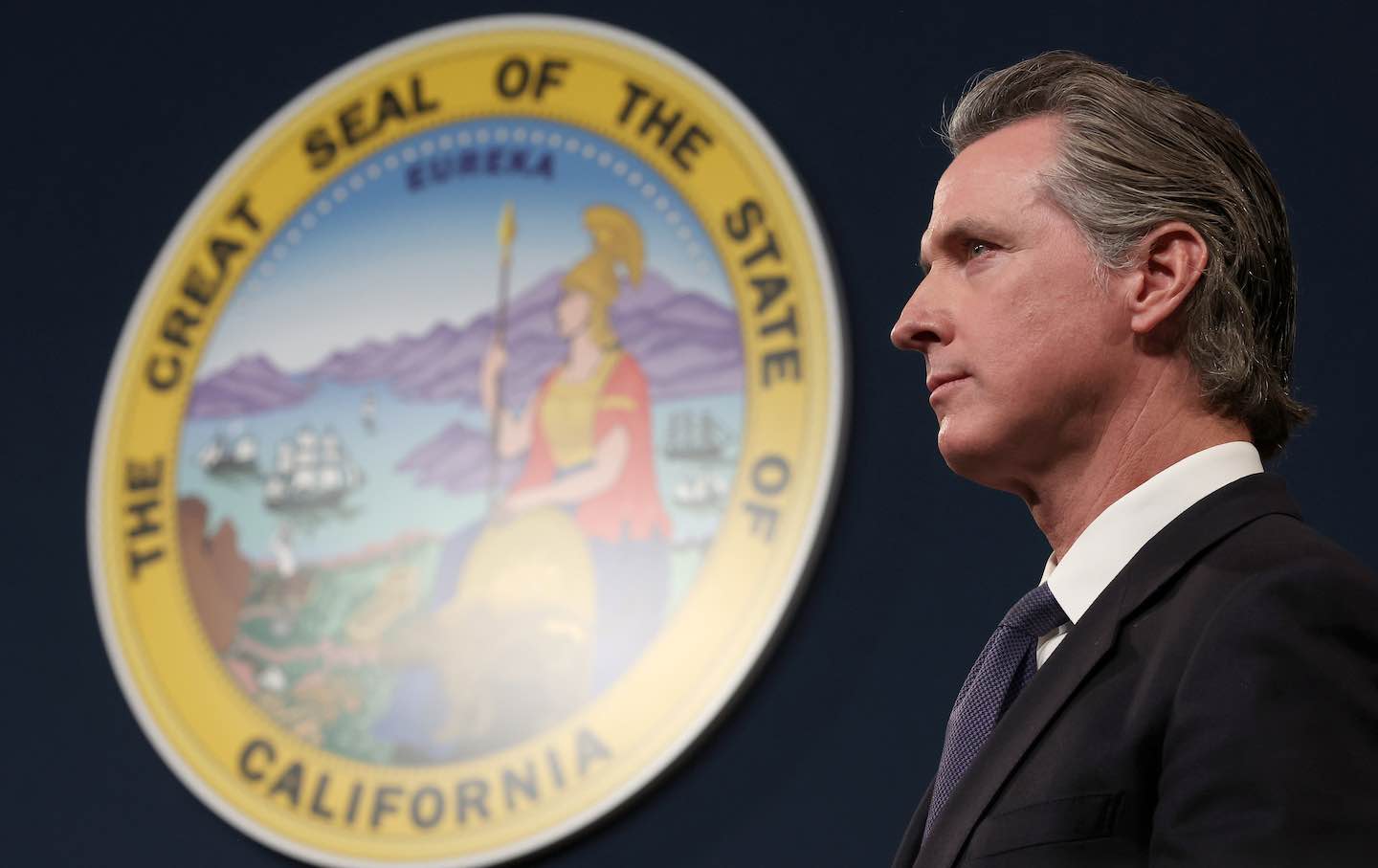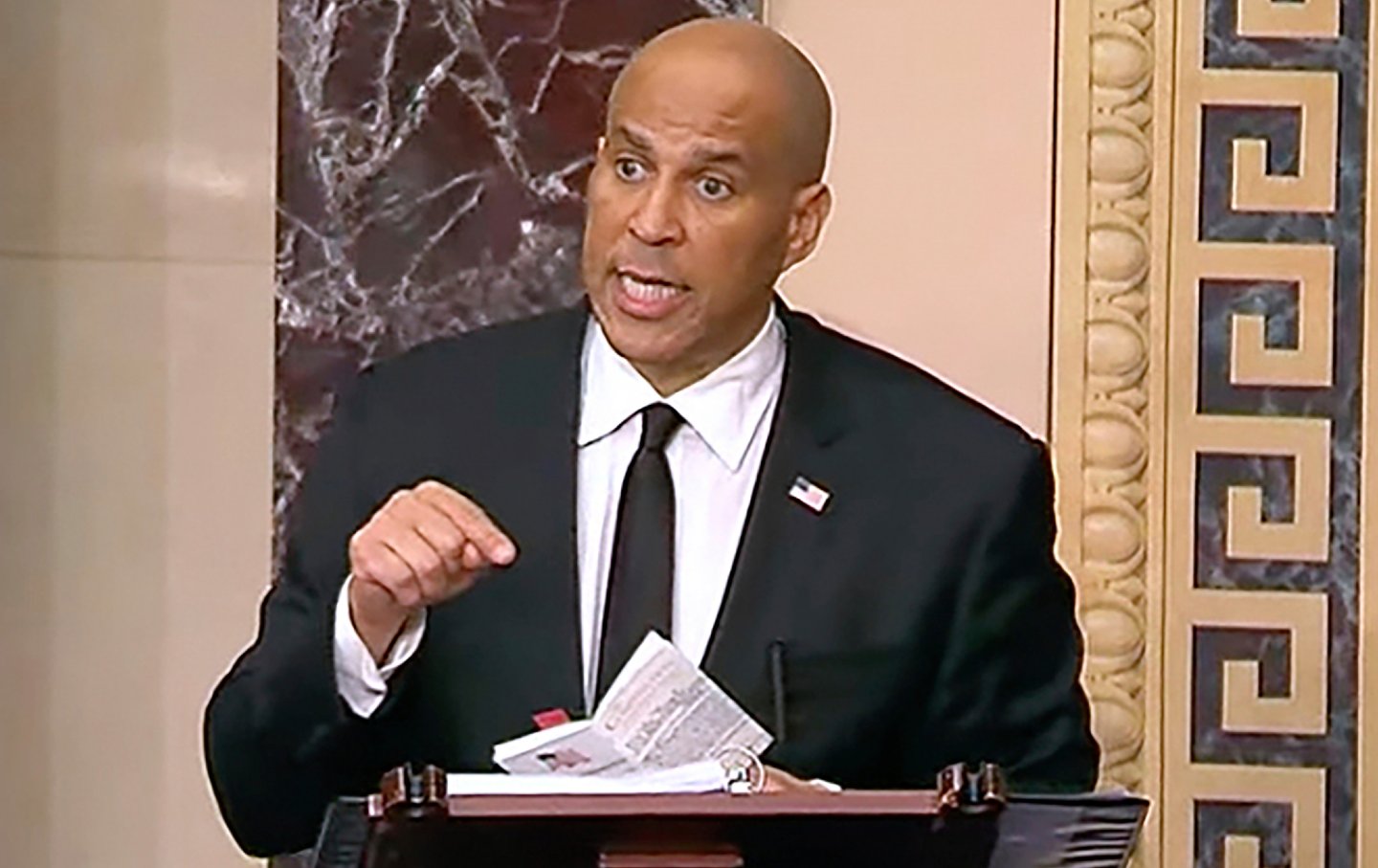Brain-Dead Bipartisanship Is Getting Us Nowhere
Democrats are making a show of their willingness to cooperate with the incoming Trump administration. That’s not their job.

Senator John Fetterman and Representative Elise Stefanik in a post from Stefanik’s X account on December 11, 2024.
(@EliseStefanik on X)Here we go again. Fresh off a failed presidential campaign that fetishized a nonexistent body of pragmatic, centrist Republican voters, and right in the midst of the GOP’s latest deranged push to trigger a government shutdown, congressional Democrats have announced their new brilliant strategy to fend off the authoritarian MAGA threat in Congress: position themselves as brisk and efficient helpmeets of their GOP counterparts. “People want to see government work, and we’re going to hold Republicans accountable for whether they’re willing to help move things forward for the American people,” Washington Democratic Representative Suzan DelBene, chair of the Democratic Congressional Campaign Committee, told ABC News. “I think we are telling them that we’re here to govern,” she went on to explain. “And I guess the question is, are they serious about governing?”
The answer, of course, is “Hell, no,” as anyone who’s paid even cursory attention to the legislative record of the modern Republican Party can readily attest. As Thomas Frank argued in his 2008 book The Wrecking Crew, the core mission of the government-baiting right is to marshal all available power and cash to demonstrate its central ideological presupposition: that government is incapable of functioning effectively. Going back to the Nixon era, Republican lawmakers and their White House allies have duly brought this self-fulfilling prophecy to pass by throttling basic government operations via a toxic assortment of privatization initiatives, austerity campaigns, rank corruption, and legal crackdowns.
In the MAGA age, we’ve seen the same basic government-smashing playbook go into overdrive, with grab-bag pledges from the incoming Trump administration to gut the federal workforce, abolish major agencies such as the Department of Education and the Federal Deposit Insurance Corporation, dismantle banking regulation more broadly, and empower the Department of Government Efficiency (DOGE)—the task force captained by techbros-without-portfolio Elon Musk and Vivek Ramaswamy—to buzzsaw through still-unspecified trillions in federal spending. (One typically asinine proposal from Ramaswamy would engineer extreme austerity by automatically firing all federal workers with odd-numbered Social Security numbers—and that is the soul of policy nuance compared to Musk, who’s pledged to enact an instant, cavalier cut in federal spending of $2 trillion, even though total discretionary spending for the last fiscal year was $1.6 trillion.)
In short, DelBene’s plan to use Democrats’ waning political capital on the Hill to ferret out how deeply the GOP is invested in governing is a fool’s errand, on the general order of scheduling a midnight tryst with Dracula to monitor his tolerance for solid food. Yet other House Democrats are already imbibing the, uh, Kool-Aid. “We have a responsibility now to try and find areas of common ground where we can deliver for Americans. I believe that starts with reducing the Pentagon’s oversized defense budget while strongly opposing any cuts to programs like Social Security, Medicare, and Medicaid,” California Representative Ro Khanna told ABC, without explaining how the DOGE initiatives he is now enthusiastically romancing would spare such vital social spending in Mike Johnson’s MAGAfied Congress. (Indeed, the next Congress, with the connivance of the dipshit auditing duo of Musk and Ramaswamy, is already reportedly eyeing Social Security cuts—failing in the process to heed the political moral of George W. Bush’s classic wrecking-crew ploy to privatize the program altogether in the heady early days of his own oversold second-term mandate for change.) Pennsylvania Senator John Fetterman, meanwhile, has been advertising his own fealty to Trump’s pet cabinet picks, from his chummy confab with UN delegate nominee Elise Stefanik to his interview with unqualified Fox News talking head Pete Hegseth as prospective secretary of defense to an embarrassing fanboy encounter in the doorway of his Senate office with health and human services dismantler-in-waiting Robert F. Kennedy Jr.
The tactical theory behind the collaborationist posture of congressional Democrats is that good-faith governing must always prevail over dogmatic obstructionism in the eyes of the electorate. In this view of things, putting pressure on the GOP’s vanishingly narrow House majority and a readily filibustered 53-vote majority in the Senate is meant to serve as a cautionary tale for voters: Surely this time, they have to understand that the Republicans just aren’t serious about governing, and act accordingly. “People are trying to set themselves up to have some credibility in other spaces to be against stuff that they’re doing,” an unnamed former Democratic House aide told ABC. “It carries more weight and legitimacy if you’re someone who’s open-minded to working with them, and then they take a hard right and you speak out.”
The only evidence against the effectiveness of this approach is all the other times it’s been tried. During his first term, Barack Obama commissioned a bipartisan legislative effort to broker a “grand bargain” to extend the George W. Bush tax cuts and cut entitlement spending—an initiative that got precisely nowhere with the obstructionist GOP, while affording the party’s anti-government Tea Party base yet another cudgel to attack Democrats for failing to follow through on their solemn pledge to enact a bipartisan, austerian agenda. Or to take a more timely example, consider the Harris campaign’s disastrous messaging on immigration: Here, yet again, a self-serious Democratic candidate patiently laid out the feckless conduct of a GOP congressional conference: Carefully crafting a sweeping immigration crackdown only to abruptly drop it so that party leader Trump could run more persuasively against alleged Democratic inaction on the border. Harris and her campaign advisers were so smitten with this line of argument that she vowed to sign the abandoned GOP bill into law at the outset of her presidency, even though a Harris win would likely have secured conditions for a far more equitable and effective legislative approach to immigration reform—which you might expect would count for something to a Democratic Party that genuinely cared about governing.
Meanwhile, the upshot of all this careful posturing on a defining issue in the campaign was something worse than nothing: Harris not only didn’t win over voters to her procedural-governance argument; Trump won a historic share of the Hispanic vote on the strength of his nihilistic mass-deportation sloganeering. Against all odds, Harris’s decision to tout the GOP’s border bill as an ideal-type brand of bipartisan lawmaking probably did more damage to her campaign than her no less purblind embrace of the Cheney clan, former GOP Georgia Lieutenant Governor Geoff Duncan, erstwhile GOP representative Adam Kinzinger, and the clutch of former Trump White House hands marooned on the Republican Party’s incredible shrinking Island of Forgotten Never-Trump Toys. It turns out that when you try to fend off xenophobic and reactionary border proposals with another set of xenophobic and reactionary border proposals, the public opts for the more brutal and less procedurally fussy option, no matter how pretty the bipartisan window-dressing may be.
The harsh political costs of Democratic accommodationism are so unmistakable that something other than politics has to animate the party’s rote fetishization of the bogus ideal of bipartisanship. My own working theory is that the procedural aura of bipartisan accord appeals to the Democrats as a party of managers. It is the prime injunction of the management class to cultivate and promote a bland aura of cheerful cooperation in an economic order riven by steepening inequalities and class resentments. And Democratic Party leaders are now routinely recruited from the country’s managerial caste. Former Walmart board member Hillary Clinton famously confessed, in the aftermath of her botched 2016 presidential run, that she was taken aback by the anger of the American electorate. In her post-campaign memoir, What Happened, she wrote:
Usually when I meet people who are frustrated and angry, my instinctive response is to talk about how we can fix things. That’s why I spent so much time and energy coming up with new policies to create jobs and raise wages. But in 2016 a lot of people didn’t really want to hear about plans and policies. They wanted a candidate to be as angry as they were, and they wanted someone to blame. For too many, it was primarily a resentment election. That didn’t come naturally to me. I get angry about injustice and inequality, abuse of power, lying, and bullying. But I’ve always thought it’s better for leaders to offer solutions instead of just more anger.
Scan the Democratic boosters of bipartisan comity and you’ll find the same sensibility everywhere. DCCC chair Susan DelBene is a former marketing director for Microsoft. John Fetterman, for all his hoodie-and-shorts-and-Yinz cosplaying, is a former insurance executive with an MBA. Barack Obama, despite running on populist themes during his two presidential campaigns, was a member of the University of Chicago’s famously market-addled law faculty, which made delusional mandates like the grand bargain intellectual catnip to him. Even in the throes of the party’s present impasse, you can see moneyed warhorses like former investment banker Rahm Emanuel, vowing as a contender to lead the Democratic National Committee to repair “the bonds of trust between the establishment and the public” while inveighing against the party’s image as “an aloof elite” in matters of language and rhetoric—the standard pseudopopulist two-step adopted by managerial Democrats since Bill Clinton’s fabled “Sister Souljah moment.” So here’s a useful rule of thumb as the second Trump term kicks off: When Democratic leaders come forward to extol the pantomime of Beltway bipartisanship as the best way to “fix things,” tell them and their fellow bosses to fuck off and get to work.








